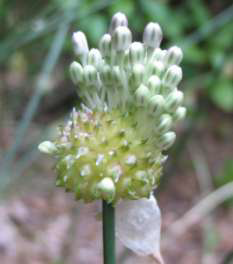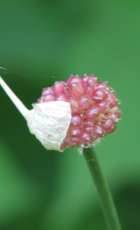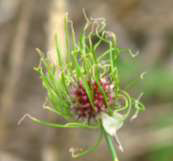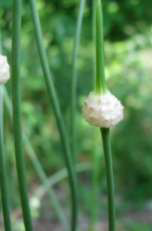 Wild Garlic
Wild Garlic
(Allium vineale L.)
|
Classification |
| Kingdom: |
Plantae |
| Phylum: |
Magnoliophyta |
| Class: |
Liliopsida |
| Order: |
Asparagales |
| Family: |
Lilaceae |
| Genus: |
Allium |
| Species: |
ineale |
 Characteristics: Wild garlic is a perennial herb growing approximately 8 to 12 inches in height. Bright green tubular leaves arise from the main underground bulb in early spring. Later in the season, a few main stalks become large and produce flowers. Greenish-white to lavender, tubular flowers appear from May to July and are above aerial bulblets. Aerial bulblets at the top of the stem are oval, smooth with shiny covering and will often sprout while still on the plant. The seeds are black, flat on one side and about 1/8 inch long. The root system consists of short, fibrous roots developing from the bottom of underground bulbs. The plants have a strong garlic or onion odor when crushed. It reproduces from seed, aerial bulblets, and bulbs. The flowers are hermaphrodite and are pollinated by insects.
Characteristics: Wild garlic is a perennial herb growing approximately 8 to 12 inches in height. Bright green tubular leaves arise from the main underground bulb in early spring. Later in the season, a few main stalks become large and produce flowers. Greenish-white to lavender, tubular flowers appear from May to July and are above aerial bulblets. Aerial bulblets at the top of the stem are oval, smooth with shiny covering and will often sprout while still on the plant. The seeds are black, flat on one side and about 1/8 inch long. The root system consists of short, fibrous roots developing from the bottom of underground bulbs. The plants have a strong garlic or onion odor when crushed. It reproduces from seed, aerial bulblets, and bulbs. The flowers are hermaphrodite and are pollinated by insects.
Habitat: Wild garlic grows in a variety of habitats, from woodlands to open fields, preferring frequently disturbed areas.
 Range: Wild garlic is native to Europe, north Africa and western Asia, however it can now be found in the eastern half of the United States and along the west coast.
Range: Wild garlic is native to Europe, north Africa and western Asia, however it can now be found in the eastern half of the United States and along the west coast.
Native American Uses: Wild garlic was used as a carminative, a mild cathartic, and a diuretic. It was also used to treat asthma, ear aches, and scurvy. In addition, a tincture was used to prevent worms and colic in children and used as a croup remedy. Also, the raw bulbs were chewed for high blood pressure and shortness of breath. The Cherokee and the Rappahannock Indians are among the Native American tribes known to have utilized this species.

Colonial Uses: The colonists used garlic to heal a wide variety of ailments including rashes and swelling, dog bites, worms, ear aches.
Modern Uses: It causes a garlic-like flavor and odor on dairy and beef products when grazed by livestock. It is sometimes considered a weed as grain products may become tainted with a garlic odor or flavor in the presence of aerial bulblets at the time of harvest.